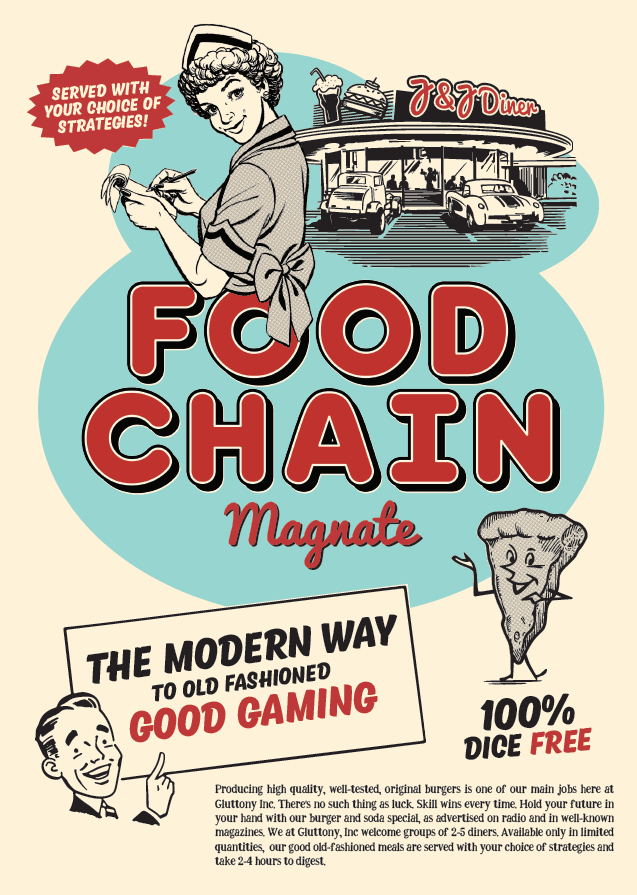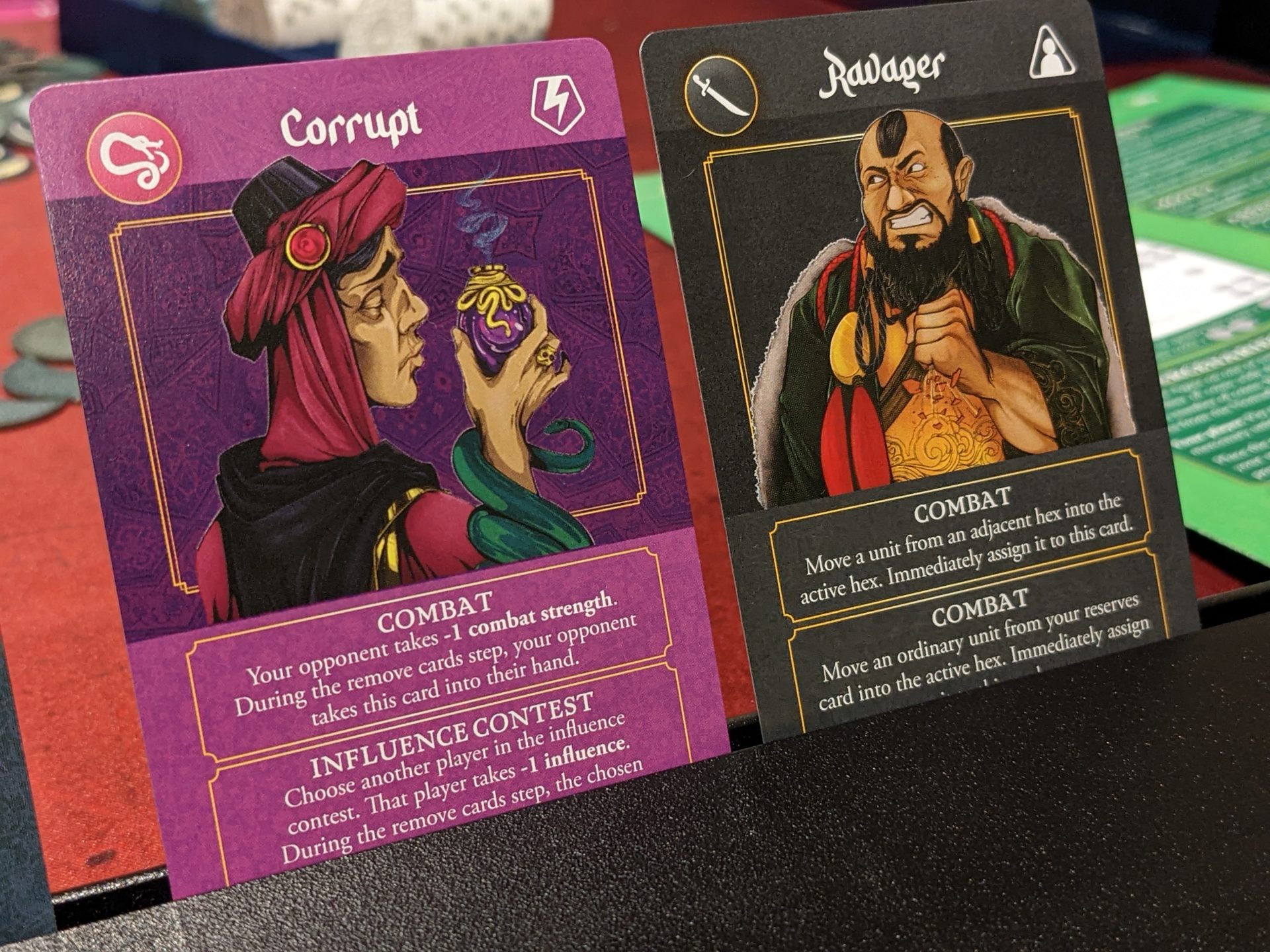The moment is still clear as day.
In 2019, I sat down to play my first—and only—game of Food Chain Magnate. Even though a veteran of this game would probably say that the best idea for a first play is to stick to 2 or 3 players, I went hog wild and did a 5-player game, with 4 of the 5 players being new.
Also, FCM veterans will note that there is an Introductory Game variant that can be used when playing with new players. This does things like remove the Milestones, which are absolutely vital to success in the full game because of the game-breaking powers granted to anyone holding that Milestone. The Introductory Game also places more money in the game’s starting bank pool, which makes the game slightly more forgiving.
My friends thought it would be best to say something akin to “Screw you, designers! You don’t know gaming like we know gaming, so let’s play ‘the full monty’ and see what this beast has to behold.”
Let’s just say that didn’t end well. For almost anyone.
Uh-Oh
After a 30-minute teach, we dove in. Unbeknownst to me and at least one other person at the table, it is usually best to select one of two specific Employee cards (Recruiting Girl and Trainer) with your opening hire. I definitely hired someone else, and happened to get squeezed by another player who sold burgers before I could, leaving me with almost no money after the first round of play.
(A quick note about money in Food Chain Magnate: you’re saying that I’m going to start a fast food business with NO MONEY in my pocket? The game nails so much thematically, but the idea that I would start a business this way still makes me laugh.)
Things in my first Food Chain Magnate game spiraled downwards from there. Within the first hour, 2 of the 5 players at the table were absolutely out of the game: almost no money to pay salaries, no market advantages, no prospects to turn the ship around. The other 3 players had all the milestones. They were better positioned to sell because of the game’s rules around customers being too lazy to drive more than one block from their home to get a pizza.
As aggravating as all of this was, I was fine losing a game I had never played before. That happens all the time. What was not OK was that we played for THREE MORE HOURS.
At this point, I had been at the table for almost 5 hours, including the teach. The one experienced player at the table did a quick scan of the mood. At this point, we had a runaway leader problem, with 2 players so far off the lead they were not coming back, and 2 players (including me) whose chances of even competing in the game ended hours ago.
“Look guys, we can quit if people aren’t enjoying themse–”
“Yep, I’m done,” I blurted out. “I stopped having fun right around the time my game was effectively over, but I thought this would have ended by now.”
The guy in the lead, naturally, wanted to keep playing, but the rest of us threw up our hands and just walked away before end-game scoring.

Out of Reach
Losing, at least for me, is fine. Losing 5 hours of time, though, is not, especially if the competitive portion of any game is over early in hour one.
Have you ever heard the term “Skunk Rule”? In table tennis, if a player is ever up 11-1 or 15-2 (on their way to scoring 21 points to ultimately win), the player in the lead automatically wins. I’ve played other sports over the years that have a “whitewash” rule, when one player or team wins if they are ever ahead by a seemingly insurmountable gap in points.
It’s the mercy rule. Sometimes, you just have to call a spade a spade, right? Often, players are way, way ahead in a game that publicly tracks the score, and late in those types of games I find myself more and more willing to walk up to a fellow player, shake their hand, and give it to them straight.
“Great game. You crushed it. I’m done.”
“Wait, you don’t want to keep pl–”
“I don’t. I concede. You are already winning by a lot, you are going to win by a lot more, I’m not having any fun, and this allows us to play this game again or something else right now, rather than dragging out the inevitable for another hour.”
Some players will insist that you are a terrible person because—and, 99% of the time, this is their problem—you didn’t give everyone a chance to finish the game.
Hogwash. I’ve been playing games forever. Remember the olden days, when players were eliminated from games and then were forced to just watch everyone else keep playing, like Risk or Monopoly?
What’s better? On one hand, you have player elimination, forcing them to outright depart the table. On the other hand, you are making every player sit at a table where they have no chance of winning, or worse, no chance of having any fun!
Just end the game when a clear winner has surfaced. Conceding a game opens up a whole world of possibilities.
Like What?
The focus of my game nights is fun. I like to take stock of what’s happening around the table each time we whip something out.
Fun means engagement. To me, that means smiles around the table. In games where someone is frustrated, I like to address it head on: what’s not working for you? Are the rules clear? Has another player been targeting you this whole time? Is it the bourbon I offered when you first walked in?
I also provide insights when I teach a new game, at least if I have played the game before. Our teacher for the game of Food Chain Magnate did not offer any tips. While I can appreciate that more competitive players don’t like to share guidance (or some players like to strike out on their own), I like to at least offer suggestions if people want them.
Even with all of that, some players just aren’t going to like a game. No problem.
Mostly, I mitigate this by playing a game’s introductory or beginner ruleset, even with very seasoned gamers. I might be the only person I know who played Terraforming Mars with this introductory variant, including the flavorless starting corporations and removing some of the minor “take that” cards from the deck.
Recently, my first two plays of Crescent Moon also used the shorter 3-round game format. I do this all the time, and that was true even before I started reviewing games to ensure I played each game’s suggested variants to fully learn the rules.
This pays major dividends. I actually think I would have returned to Food Chain Magnate had I first seen the game with the introductory variant. Instead, all I have are PTSD flashbacks of my first 5-hour play, which convinced me it’s not my kind of game.
Usually, games have a recommended set of cards to be placed in the market, or a suggested starting hand, or “first play” tiles, that can be used with new players. In this way, I can make a game one hour instead of two, which helps players stay at the table long enough to get a taste of the game and decide if they want the bigger serving instead.

But Don’t You Fear Anger from the Table?
As Jordan Peele might say, “Nope!”
Again, 99% of the time, it’s someone else’s ego that upsets them when a player walks away.
“You can’t just concede, man! I was just about to take the lead, and if you leave, that ruins everything!”
Translation: “You can’t just walk away! I was going to use your dead carcass to get more of the resources I need to milk the table just long enough to sneak up on the other players at the end! If you leave, that ruins everything for me, while you get to start the 30-minute drive home and have more fun without us!!”
I also tend to be the person who can emotionally drag down the table if I’m getting demolished with zero chance of a comeback in a longer game. No one enjoys the sidebar commentary or the obligatory “let me look at ESPN on my phone while I take meaningless turns in a game that’s already over.”
Now, I’ll grin and bear it if I’m getting blown out but 3 other players are in tight contention for the lead, of course. I’m not pulling this move if other players are mostly in contention with each other and there’s plenty of time left for anyone else to make a move.

Yes, I Concede
Remember, we are not talking about conceding a short game like The Crew. We are talking about conceding long, heavy strategy games, when you know that you and everyone else at the table have been knocked out of contention by the halfway point of play.
I’m not conceding a game where the final score ends up being 102-86. I’m talking about hours-long games where you are down by thousands of dollars in an economic game where everyone’s total is public, you have a pile of $28 in poker chips, and it’s round 5 of 7 where your buddy Stu is way ahead of everyone else.
Concede, friend. Tell everyone the truth: you are miserable.
“Stu, great job boxing me out of that worker placement spot in round 2 that broke my game. No, no, seriously, great work and smart play. That’s what I would have done to you given the same opportunity. But it’s 11:45 PM on a school night, I’m getting blown off the table, and I’m not going to learn anything else by watching you finish the last two rounds. Hopefully, I’ll get you next time!”
And that can be that. Recycle those beer bottles, throw away your trash, help clean up and be on your way. No one is going to talk badly about you for doing it—in fact, most players will come to their senses when they realize that they were the only person having any fun. You might even find that if you are the person who was way ahead that offering to end the game early might be the right move, paying dividends down the line with your gaming group.
Just know that conceding a game is a tool, a tool that will need to be whipped out on occasion. Why would you continue playing a game when you are not having fun? Having fun is what games are all about!











There have been many a moment, way back in the day, when I should have conceded a game.
There have been many a moment, way back in the day, when I should have just asked if the other players want to call it.
Mostly — not entirely — I have learned this lesson and put it to good use. Sometimes, I have gotten caught up in my own funk and not wanted to upset my friends (note: they would not have been upset). Sometimes I have gotten caught up in my own elation and not wanted to end the high (note: nobody else was having fun). If you are no longer enjoying things and an obvious winner is sitting at the table, nobody *should* mind if you just call the game early. If you are the obvious winner sitting at the table, nobody *should* mind if you just call the game early.
So what is the issue? I believe that you suggest much of it here, and get right to the point at the end of the article: games are supposed to be fun. That is the ‘why’ of their existence and our love of them. Every 30 minutes or so, take the pulse of the table. This is especially important if you are the host. Check the faces and the demeanor of the players. Make sure this is a good time being had by all. Be ready to call it if things have been decided. Many games have decent come-back mechanisms. If those can be employed, talk about them.
Honorable concession has been a part of games forever. It is embedded in games like Chess. There is nothing taboo about this practice.
Thanks for the note David. I just conceded a game with some friends over the weekend, and it was great in that it didn’t affect the other players still in contention. Hopefully, more people embrace this idea!